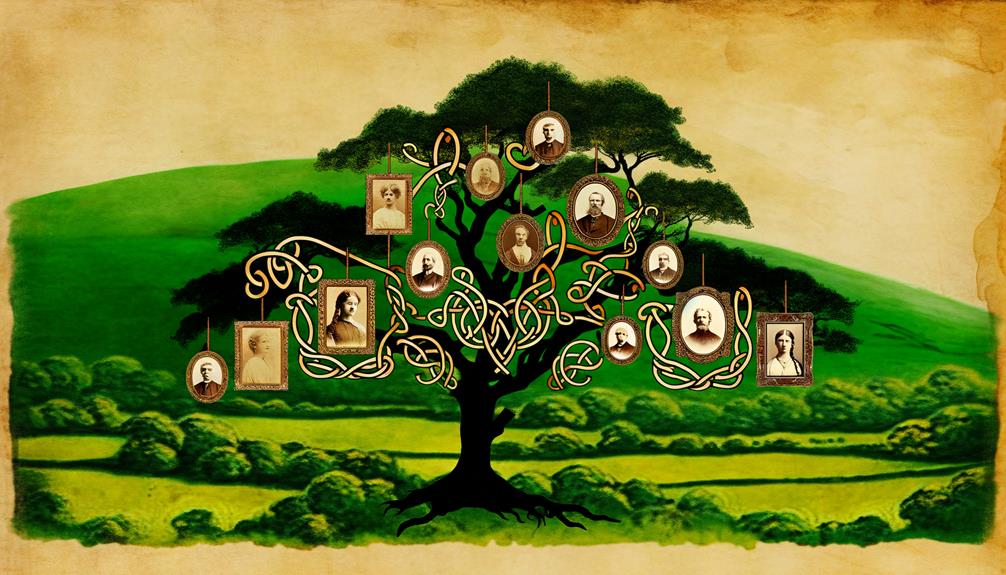Morris Name Meaning and Origin
The name Morris, deriving from the Latin 'Mauricius' meaning 'dark' or 'Moorish', has a rich historical background. Its journey through Old French as 'Maurice' highlights the linguistic shifts prompted by the Norman Conquest.
The surname appeared prominently in medieval England, showcasing Norman cultural integration. With the migration of European settlers in the 17th century, Morris became woven into the fabric of American history.
Cultural significance is also seen in Morris dancing and notable individuals bearing the name. If interested, further exploring will uncover the name's evolution and its contemporary significance. Furthermore, the name Morris has also been utilized in various forms across different cultures, including the Icelandic ‘Mórús’ and the Norwegian ‘Mauritius’. The origin of the name Olaf, derived from the Old Norse name ‘Áleifr’, holds similar historical and cultural significance, and its evolution can also be explored in depth. Studying the etymology and impact of these names provides a fascinating glimpse into the interconnectedness of language and history.

Key Takeaways
- The name Morris originates from the Latin term 'Mauricius,' meaning 'dark' or 'Moorish.'
- Morris evolved through Old French as 'Maurice,' reflecting Norman Conquest linguistic shifts.
- It became a popular surname in medieval England and is recorded in the Domesday Book.
- European settlers brought the name Morris to America from the 17th century onwards.
- Morris has modern variations like Maurice in France and Moris in Spain, showcasing its linguistic adaptability.
Etymology of Morris
The etymology of the surname 'Morris' can be traced back to its roots in the Latin name 'Mauricius,' which means 'dark' or 'Moorish.' This nomenclature was historically used to describe individuals of North African descent, particularly the Moors.
Over time, the name evolved through linguistic and cultural metamorphoses. During the medieval period, 'Mauricius' was adapted into various forms across Europe, reflecting the region's interactions with the Roman Empire and subsequent cultural shifts.
The name's evolution highlights the intermingling of languages and the enduring influence of Latin on European onomastics. Understanding the origins of 'Morris' provides insight into historical migration patterns and the lasting impact of Roman nomenclature on modern surnames.
Latin and Old French Roots
The name Morris has its origins in the Latin term 'Mauricius,' which denotes a person of Moorish descent.
This Latin root was subsequently adapted and propagated through Old French as 'Maurice,' reflecting the linguistic shifts following the Norman Conquest.
The transformation highlights the interplay between Latin and Old French influences on the evolution of the name.
Latin Origins Explained
Rooted in historical linguistics, the name Morris derives from the Latin term 'Mauricius,' which later evolved through Old French influences. The Latin 'Mauricius' itself is a derivative of 'Maurus,' meaning 'Moorish' or 'dark-skinned,' highlighting its ethnographic origins. The etymological journey of the name is as follows:
| Term | Language Origin |
|---|---|
| Mauricius | Latin |
| Maurus | Latin |
| Mauritius | Latin |
| Maurice | Old French |
| Morris | Old French/English |
Understanding these transformations aids in appreciating the historical depth of the name Morris. Latin, as the progenitor, provides a foundational context, showcasing the name's evolution from a descriptor of ethnic identity to a widespread personal name in medieval Europe.
Old French Influence
Old French linguistic influence played a pivotal role in the evolution of the name Morris, seamlessly integrating Latin origins into medieval European lexicon. The name's etymology can be traced back to the Latin 'Mauricius,' which transformed into 'Maurice' in Old French. This change reflects the broader linguistic changes occurring in medieval Europe, where Latin served as the scholarly lingua franca, and Old French became the vernacular.
Latin Origins: Originates from 'Mauricius,' a Latin name meaning 'dark-skinned' or 'Moorish.'
Old French Adaptation: Evolved into 'Maurice,' demonstrating the phonetic and orthographic shifts typical of Old French.
Medieval Context: The use of Morris in medieval England was further popularized by the Norman Conquest.
Morris in Medieval England
During medieval England, the name Morris emerged as a popular surname influenced by various cultural and linguistic factors. Derived from the Old French name Maurice, which itself has roots in the Latin name Mauricius, Morris was initially used to denote someone with a dark complexion, referencing the Moors.
The Norman Conquest of 1066 facilitated the introduction of many Norman names, including Maurice, into the English lexicon. Over time, Maurice evolved into Morris through phonetic shifts and the Anglicization process. Records from the Domesday Book and other medieval documents frequently mention individuals bearing the name Morris, highlighting its prevalence.
The name became entrenched in English society, reflecting the broader trend of Norman cultural assimilation within medieval England.
Migration to America
As waves of European settlers journeyed to the New World, the name Morris was carried across the Atlantic, becoming an integral part of the burgeoning American society. Historical records indicate that individuals bearing the Morris name began arriving in America as early as the 17th century.
This migration was driven by several factors:
- Religious Freedom: Many sought refuge from religious persecution in Europe.
- Economic Opportunities: The promise of land and prosperity in the colonies attracted numerous Morris families.
- Political Instability: Conflicts such as the English Civil War prompted migration.
Early Morris settlers contributed to the development of colonial America, participating in agriculture, trade, and governance. Their legacy is documented in various historical records, underscoring their role in shaping the nation.
Cultural Significance
The Morris name has not only been a fixture in the annals of American history but has also woven itself deeply into the cultural fabric, influencing various aspects of societal development and identity formation.
Historically, the Morris name has been associated with early settlers who contributed to the agricultural and industrial growth of the nation. Its presence in literature, art, and local folklore underscores a rich tapestry of cultural influence.
For instance, Morris dancing, a traditional English folk dance, was brought to America and helped preserve cultural heritage. Additionally, the name's integration into place names, such as Morris County in New Jersey, signifies its enduring legacy.
The Morris name continues to be a symbol of cultural resilience and historical continuity.
Famous People Named Morris
The name Morris has been borne by several prominent figures throughout history, contributing greatly across diverse fields.
In the world of politics and reform, Gouverneur Morris was a Founding Father of the United States and a key author of the Constitution.
The entertainment industry has seen influential figures like actor Philip Morris, while sports history includes notable athletes such as Jackie Morris, a pioneering figure in professional baseball.
Influential Morris in History
Throughout history, several individuals named Morris have left indelible marks in various fields, demonstrating the name's association with influence and achievement. One prominent figure is Gouverneur Morris, a founding father of the United States who authored large sections of the U.S. Constitution.
Additionally, Morris Dees, co-founder of the Southern Poverty Law Center, has contributed remarkably to civil rights advocacy. Furthermore, William Morris, a 19th-century British textile designer, played a pivotal role in the Arts and Crafts Movement.
- Gouverneur Morris: Key author of the U.S. Constitution.
- Morris Dees: Co-founder of the Southern Poverty Law Center.
- William Morris: Influential figure in the Arts and Crafts Movement.
These individuals exemplify the diverse contributions of those bearing the name Morris.
Morris in Entertainment Industry
Numerous individuals named Morris have made significant contributions to the entertainment industry, leaving lasting legacies in film, music, and literature.
Esteemed actor Morris Chestnut has captivated audiences with his performances in films such as 'Boyz n the Hood' and television series like 'Rosewood.'
In the domain of music, Morris Day, lead singer of The Time, played a pivotal role in the Minneapolis sound movement of the 1980s.
Literary circles celebrate Morris West, an Australian novelist noted for works like 'The Shoes of the Fisherman,' which became an international bestseller.
These figures highlight the diverse talents and enduring impact of individuals named Morris in various entertainment spheres, enriching cultural history and influencing future generations.
Notable Morris in Sports
In the world of sports, individuals named Morris have distinguished themselves through exceptional athletic prowess and noteworthy achievements across various disciplines. Their contributions span from groundbreaking performances to influential roles in their respective sports.
- Jack Morris: A renowned pitcher in Major League Baseball, Jack Morris is celebrated for his remarkable career, including four World Series titles and being inducted into the Baseball Hall of Fame in 2018.
- Chris Morris: A former NBA player, Chris Morris made his mark with the New Jersey Nets and Utah Jazz, known for his defensive skills and versatility on the court.
- Alfie Morris: A notable figure in English football, Alfie Morris played as a forward, contributing significantly to the teams he represented during the mid-20th century.
These Morris athletes have left indelible marks on their sports' history.
Popularity Over Time
The name Morris has experienced fluctuating levels of popularity over the decades, often influenced by cultural, social, and historical factors. In the early 20th century, Morris was relatively common in English-speaking countries, buoyed by immigration patterns and the prominence of notable individuals bearing the name.
The name saw a decline mid-century as naming trends shifted towards more modern and unique choices. Historical events, such as the World Wars, also played a role in these shifts, impacting the popularity of many traditional names.
Modern Usage and Variations
Although the name Morris saw a decline in popularity through the mid-20th century, its modern usage has persisted, often adapting through various cultural contexts and linguistic variations.
In contemporary settings, Morris retains a robust presence, particularly in English-speaking countries. Its variations are evident across different cultures, demonstrating its adaptability and enduring appeal.
- In the United States, Morris is often associated with historical figures and cultural icons, maintaining a steady, if modest, presence.
- In France, the name appears as Maurice, reflecting a more traditional form still in use today.
- In Spain, the name transforms into Moris, showcasing its linguistic flexibility.
These variations underscore the name's wide-reaching influence and its ability to evolve with cultural shifts.
Conclusion
The name Morris, intertwined with Latin and Old French roots, evolved uniquely through medieval England before migrating to America. Its cultural significance is underscored by its presence among notable individuals across centuries.
While its popularity has fluctuated, modern usage and its variations persist. Juxtaposing its historical depth against contemporary adaptations reveals a dynamic interplay between tradition and modernity, illustrating how names serve as cultural artifacts that bridge past and present.






